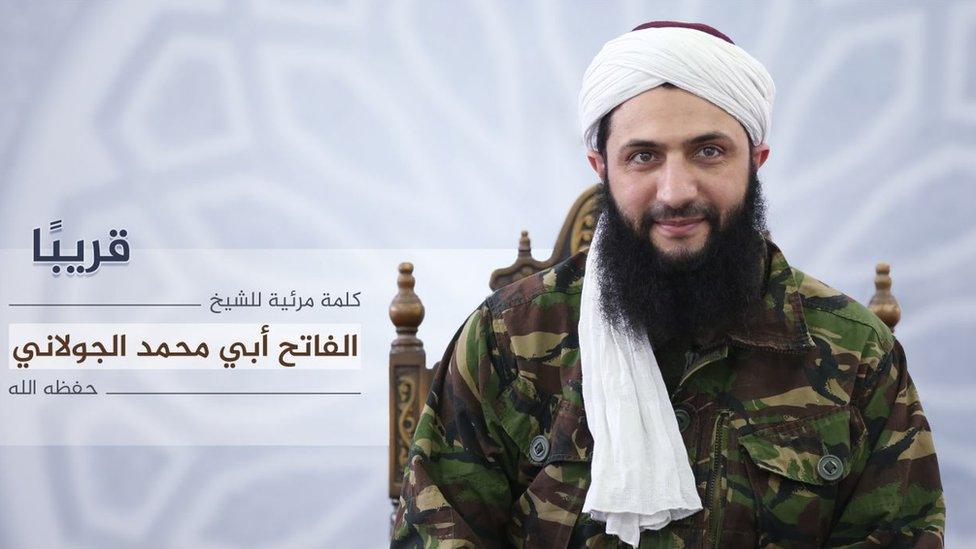Syrian Nusra Front announces split from al-Qaeda
- Published

It was the first ever recorded message by Abu Mohammed al-Jawlani
Syrian jihadist group Jabhat al-Nusra, also known as the Nusra Front, has announced it has split from al-Qaeda.
Leader Abu Mohammed al-Jawlani, in his first recorded message, said its new name would be Jabhat Fateh al-Sham (Front for the Conquest of the Levant).
He said the move was intended to remove the pretext used by powers, including the US and Russia, to bomb Syrians.
The US responded by saying it saw no reason to change its view of the group as a terrorist organisation.
White House spokesman Josh Earnest said the US also had increasing concerns that the group intended to attack the West.
"The United States continues to assess that Nusra Front leaders maintain the intent to conduct eventual attacks in and against the West and there continues to be increasing concern about Nusra Front's growing capacity for external operations that could threaten both the United States and Europe," he said.
Al-Qaeda said earlier that it supported the split. Its second in command, Ahmed Hassan Abu al-Khayr, said the organisation had instructed "the leadership of the Nusra Front to go ahead with what protects the interests of Islam and Muslims and what protects jihad" in Syria.
The message included a brief comment from al-Qaeda leader Ayman al-Zawahiri saying: "The brotherhood of Islam is stronger than any organisational links that change and go away."
Why did Nusra detach from al-Qaeda?
In the recording aired by al-Jazeera's Arabic news channel, Jawlani thanked the "commanders of al-Qaeda for having understood the need to break ties".
He said the decision was made to "expose the deception of the international community, namely the US and Russia, in their relentless bombardment and displacement of the Muslim masses of Syria under the pretext of bombing al-Nusra Front".
The new group "will have no links whatsoever with foreign parties", he added.
Analysts say the Nusra Front decided to rebrand itself after the US and Russia stepped up their military efforts against the group.
It is understood the group hopes to form closer alliances with other Islamist groups fighting in Syria.
Last week, US Secretary of State John Kerry and his Russian counterpart Sergei Lavrov said they had agreed on "concrete steps" to tackle jihadist groups like the Nusra Front and the so-called Islamic State (IS).
Nusra Front was excluded from February's cessation of hostilities agreement.
Al-Nusra first announced its existence in a video posted online in early 2012, some months after the Syrian civil war began.
It has been claimed that Qatar has relatively close ties with the group, probably through intermediaries.
In April 2013, al-Nusra refused to join forces with IS and pledged allegiance instead to al-Qaeda.
Clashes broke out between the two groups and al-Nusra was pushed out of its base in Deir Ezzor, eastern Syria.
Observers say the group numbers between 5,000 and 10,000 fighters, the vast majority of them Syrian.